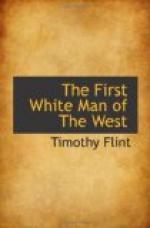And what is stranger, left
behind a name,
For which men vainly decimate
the throng;
Not only famous, but of that
good fame,
Without which glory’s
but a tavern song;
Simple, serene, the antipodes
of shame,
Which hate or envy e’er
could tinge with wrong;
An active hermit; even in
age the child
Of nature, or the Man of Ross
run wild.
’Tis true, he shrank
from men even of his nation,
When they built up unto his
darling trees;
He mov’d some hundred
miles off, for a station,
Where there were fewer houses
and more ease.
The inconvenience of civilization
Is, that you neither can be
pleased, nor please.
But where he met the individual
man,
He showed himself as kind
as mortal can.
He was not all alone; around
him grew
A sylvan tribe of children
of the chase,
Whose young unwaken’d
world was always new;
Nor sword, nor sorrow, yet
had left a trace
On her unwrinkled brow, nor
could you
A frown on nature’s,
or on human face.
The free-born forest found,
and kept them free,
And fresh as is a torrent
or a tree.
And tall, and strong, and
swift of foot were they,
Beyond the dwarfing city’s
pale abortions;
Because their thoughts had
never been the prey
Of care or gain; the green
woods were their portions
No sinking spirits told them
they grew gray,
No fashion made them apes
of her distortions.
Simple they were; not savage;
and their rifles,
Though very true, were not
yet used for trifles.
Motion was in their days;
rest in their slumbers;
And cheerfulness, the handmaid
of their toil;
Nor yet too many, nor too
few their numbers;
Corruption could not make
their hearts her soil
The lust, which stings; the
splendor which encumbers,
With the free foresters divide
no spoil.
Serene, not sullen, were the
solitudes
Of this unsighing people of
the woods



